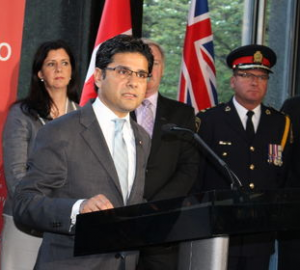Ontario’s Minister of Community Safety and Correctional Services, the Honourable Yasir Naqvi, introduced the Police Record Checks Reform Act (PRCRA) in the provincial legislature this week. The new legislation outlines what can be disclosed by police officers on police records and legislates procedures on requesting, conducting and disclosing police record check information. The practice of disclosing non-conviction information including mental health information is discriminatory to individuals who have come in contact with the police. CMHA Ontario was consulted during the drafting of the PRCRA as the Division has been advocating for legislative change on this issue for almost a decade.
The PRCRA, which reflects the Ontario Association of Chiefs of Police (OACP) Law Enforcement and Records (Managers) Network (LEARN) Guideline for Police Record Checks, will:
- Outline how police record checks are to be requested, provided and disclosed.
- Allow anyone to obtain a police record check for themselves.
- Require that written consent is given by the individual in order for the police to disclose the police record check information to a third party (i.e employer or volunteer organization).
- Prohibit the disclosure of information related to Mental Health Act apprehensions.
- State when non-conviction information can be disclosed in exceptional circumstances
- Outline procedures for reconsideration and correction of information provided in a police record check.

At the press conference in Toronto on Wednesday, Minister Naqvi stated that the proposed Police Record Checks Reform Act is in response to countless situations where Ontarians have had personal information, such as dropped criminal charges or mental health interactions, shared with a potential employer or peer.
“These changes will ensure that Ontarians are not negatively impacted by records of police contacts that do not pertain to criminal activity,” Naqvi said.
CMHA commends Minister Naqvi and the Government of Ontario for introducing the Police Record Checks Reform Act. This important legislation marks a positive step towards ensuring that mental health police records are not treated like criminal records.
“Mental health police records are helpful when the information is used internally by police to assist a person experiencing a mental health crisis,” said Camille Quenneville, CEO of CMHA Ontario. “But the disclosure of this information for other purposes can create barriers for people and increase mental health stigma.”
“These legislative changes provide a model for governments across Canada and help reduce the discrimination and stigma experienced by people living with mental illness”, said Peter Coleridge, National CEO, CMHA. “CMHA National is proud to have worked with colleagues across Canada to establish a unified position on this issue. We are now asking all governments and police forces to act on this matter in the same way the Government of Ontario has chosen to.”
CMHA Ontario is Co-Chair of the Police Records Check Coalition (PRCC), a group of more than 30 people and organizations comprising health law and human rights legal experts and representatives from the Canadian Civil Liberties Association (CCLA), Ontario Association of Patient Councils, the Schizophrenia Society of Ontario and the John Howard Society of Ontario (JHSO). For more information on police records and how they can impact individuals, visit the Coalition’s website at www.PRCCOntario.ca.